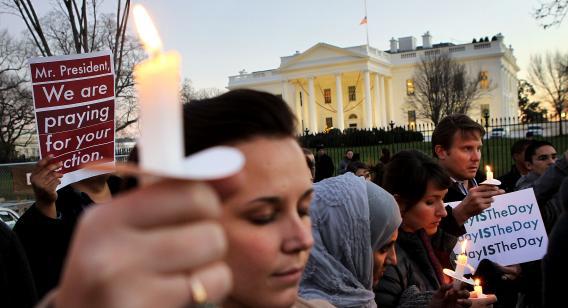The question has really become a cliché. After any mass shooting, we wonder, will this change the conversation? (In fact, your humble Slatest contributor asked just this question in July, after the Aurora movie theater rampage.) The answer is always a resounding no. The reason is simple. As one Republican strategist tells the Los Angeles Times: “You think Social Security is the third rail of politics, try guns.” So it seems you likely won’t go broke if you were to bet that the massacre of 20 children (and seven adults) will do nothing to change the political calculus in Washington. Yet perhaps the conventional wisdom is wrong? After all, it might very well underestimate the raw emotional reaction to the murder of children, which was plainly evident in President Obama’s tear-filled eyes Friday.
New York Mayor Michael Bloomberg, a strong advocate for stricter gun-control legislation, didn’t hesitate to call on Obama to do more. “Calling for ‘meaningful action’ is not enough,” Bloomberg, co-chairman of Mayors Against Illegal Guns, said. “We need immediate action. We have heard all the rhetoric before.” There has been such little attention paid to the issue that the last major new gun law approved by Congress was in 1994, points out USA Today. Yet so far at least the pressure to do something might be greater. The call to pass new gun-control measures has been much more forceful this time than after other mass shooting sprees, points out Politico. And some liberals say Obama no longer has an electoral excuse to ignore the issue: “His reading of the Constitution should no longer be constrained by a sense of what the conventional wisdom is in this precinct or that,” writes The New Yorker’s David Remnick.
That fact is seen as key because no matter what lawmakers say, Obama is the one who has the power to decide whether the issue takes center stage or merely fades into the background again, notes the Associated Press. One challenge advocates for more gun control are likely to face though is that none of the stricter gun-control measures that have been under discussion for years would have been able to avert Friday’s massacre.
In the Wall Street Journal, Adam Winkler writes that gun control advocates “still face the problem of identifying laws that will prevent mass shootings.” Many, for example, have called for the re-enactment of the assault weapons ban, but so far it doesn’t seem that would have stopped Adam Lanza, who relied on “commonplace handguns” inside the school. [Update, 9:41 p.m, Dec. 16: Recent reports now say Lanza used a semi-automatic rifle for most of his rampage.] The weapons were also reportedly legally purchased by Lanza’s mother who, at least for now, seemed to be a respectful gun owner who followed all the rules.
“The sad reality is that in a nation awash with approximately 300 million guns, no law can be counted on to completely eliminate access by criminals or the mentally ill,” writes Winkler. In the National Review, Charles C.W. Cooke points out that Connecticut regulates access to guns more strictly than most other states. “To believe that yesterday’s crime could have been prevented, you have to presume either that a man willing to go to such grievous lengths could have been deterred from doing so by stronger laws, or that those stronger laws could rid America of privately available guns completely,” writes Cooke.
While it may seem like mass shootings are becoming more common in the United States, those who study the issue say that is not the case, reports the Associated Press. One criminologist says the peak was reached in 1929.
